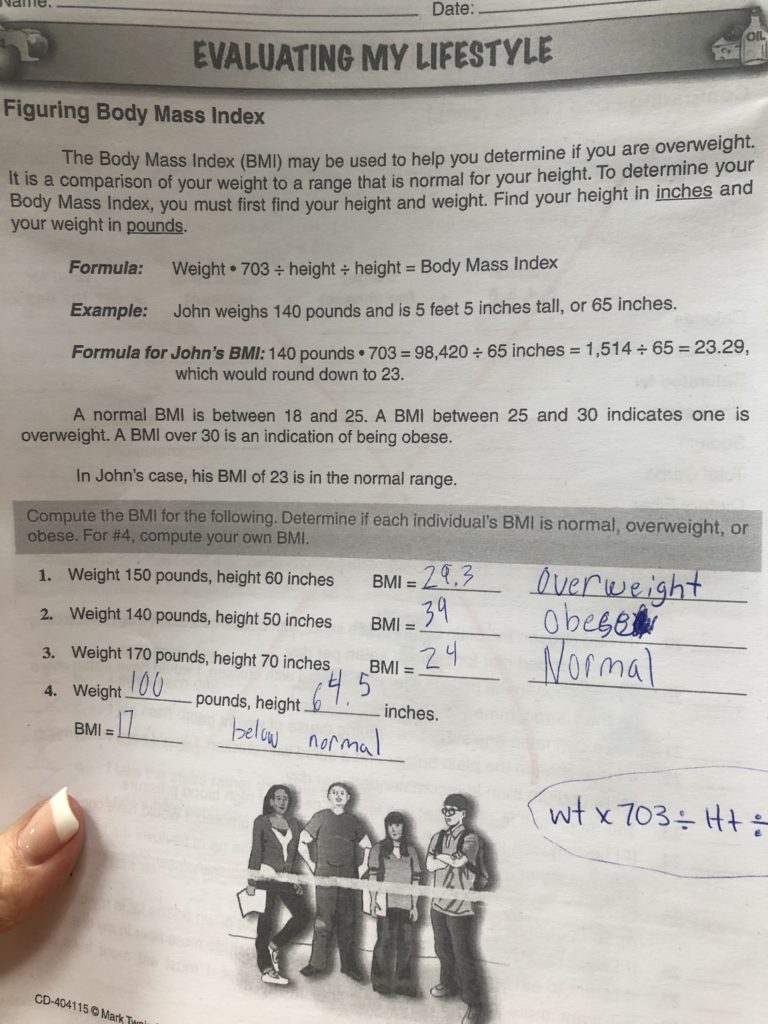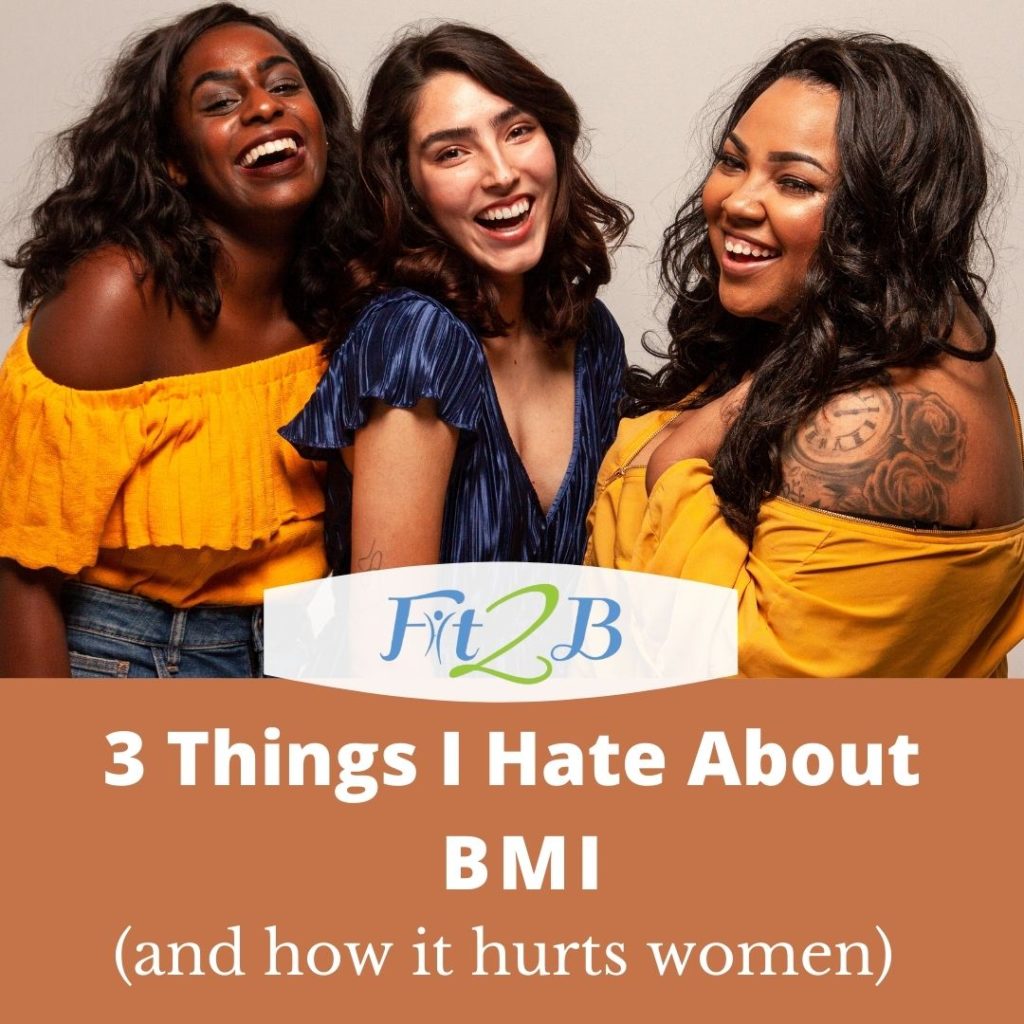Blog
3 Reasons I hate the BMI {and how it hurts women’s health}
Two situations from two totally different arenas of my life put the Body Mass Index (BMI) on my radar last week: My son’s homework assignment and a very sad client dealing with discrimination from her insurance program. Weight loss is a very personalized path for everyone, and Fit2B has helped thousands of people with managing their weight via non-stressful exercise. However…
I have never been a fan of BMI, and I don’t use it in during any of my personal training intake evaluations because I’ve known for a long time how outdated, unscientific, narrow, discriminatory, and inaccurate it is. Thus, I was truly shocked to see it in my son’s health curriculum and even more shocked to hear it’s being used to limit healthcare for some of my clients right this very moment.

My son’s BMI homework
It teaches him to judge a person’s health based on their height and weight using a simple formula known as the Body Mass Index (BMI) which goes like this:
Your weight times 703 divided by your height in inches divided by your height in inches again.
BMI is considered normal if it’s between 18-25
BMI is overweight if it’s between 25-30
You’re “obese” if your BMI is over 30
That formula means that my BMI was 29 when I launched Fit2B. However, I was definitely not obese! It’s 24 now… Yet I’m not worried.

I eat incredibly healthy thanks to THM. I exercise daily, and I don’t mean to brag, but I look hot in a bikini 😉 I’m very strong, fairly lean, and I can race walk faster than most people jog. My blood pressure is low. My cholesterol is fabulous. My body composition of lean mass vs. fat mass is in a fit range… yet my BMI indicates that I’m one number away away from being “overweight.”
I can shrug that off. I can also shrug off how it labels my son “below normal” because he’s a 13 year-old bundle of muscle and fiber right now despite eating everything in sight. We aren’t facing any medical discrimination over these numbers, but other people are – especially women – and it needs to stop.
3 Reasons I hate Body Mass Index (BMI)
- It’s an outdated formula made by a mathematician not a physician. This article by NPR calls it a 200 year-old hack produced in the early 19th century by a Belgian mathematician – not a physician – name Lambert Quetelet to help the government allocate resources based on obesity measurements in the general population in the 19th century.
- It is used to foster medical discrimination. Just like car insurance companies often charge higher rates to people with red cars, many health insurance companies discriminate against those with a borderline BMI.
- It doesn’t allow for the differences between males and females. It fails to make any allowances for various stages of the female life cycle including weight gain fluctuations associated with PMS, pregnancy, postpartum, breastfeeding, perimenopause, and menopause.
Danielle shared, “We had a health sharing policy that made me do weekly phone counseling about portion control because I needed to lose weight. My weight shot up after I had a miscarriage and my hormones went crazy. I don’t know what an oversized portion even looks like. This sent me into a huge depression and I was very happy to get rid of that policy. It was cruel!”
This is what a 24 looks like…
That’s my body during the silver workouts we filmed in January, 2021. My BMI was a 24, one number away from overweight. Here’s what the BMI doesn’t see:
- I’m a size 4-6.
- I instructed 6 fitness routines that day.
- My blood pressure & cholesterol are healthy.
- My Diastasis Recti is healed.
- I am flexible & strong.
- I’m a competitive racewalker.
- I’m actively involved in my community.

Here’s the original post in my forum that provoked this blog:
“I’m between frustrated and angry. Yearly our sharing ministry {a.k.a. alternative to health insurance} requires us to submit our BMI and waist circumference. I’ve been working really hard at gaining strength and only eating when hungry. I’ve increased my protein and I get the hydration I need. I’m around 21% body fat [totally healthy for a woman] I’m about to be put into a health partners program because I’m considered obese because despite a 33 inch waist and good body fat percentage, my muscle mass has now pushed my BMI to 27. Ugh.”
Another member responded saying, “Our insurance company did this and enough people complained that now you can choose from several different methods for assessing body composition.”
Crystal shared, “Yeah, I’m an experienced marathoner, a size 2 or 4, depending on the brand. I’ve got a 26-inch waist. I’m a small woman! Yet my BMI would tell you I’m a little on the chunky side (I’m very muscular on my lower half from so much running). It’s clearly not a perfect tool, and I can’t believe anyone still uses it.”
Jeanie wrote, “For my life insurance I had to submit my weight (can’t remember about waist measurement) and I was 8 months pregnant. They didn’t even have a place to note that I was pregnant!”
Kristin commented, “My nutritionist and personal trainer gave me the “You’re healthy!” yet my weight says for a healthy bmi I need to lose another 60lbs.”
To sum up, we’re not in the 19th century anymore. We now have far more accurate and precise ways than the body mass index (BMI) I to determine if a person is morbidly obese, meaning dangerously overweight to the point of it affecting their health. The BMI fails to make allowances for major differences in body composition between males and females. Also, this isn’t a formula designed by a doctor based on any scientific evidence, yet it’s been used to judge and stereotype and limit people – especially women – in thousands of ways.
Leave a comment?
What do you think of the BMI standard? Has it impacted you positively or negatively in any way? What label does it give you, and do you think that label is accurate? Now that you know a little more about it, what are your thoughts about insurance companies using it?

I agree!! My BMI says I’m obese, yet I’m a healthy large family momma with extra fluff. The statistic has affected my life insurance, where I was deemed higher risk and couldn’t get on the same level plan as my husband. Multiple times I’ve run into health care workers dramatically fudging my weight on forms to fit it into the acceptable range. It’s so frustrating and disheartening.
It’s super disheartening! The fact that healthcare workers even see the discrepancy and shift the numbers tells us something very eye-opening!
Our health insurance gives you discounts if you are in a normal BMI range, lower waist circumference, and healthy blood pressure. I was so mad because as a female I was supposed to have a smaller waist than my husband who had not had a baby within the past year. Just doesn’t make sense at all!
healthy blood pressure. I was so mad because as a female I was supposed to have a smaller waist than my